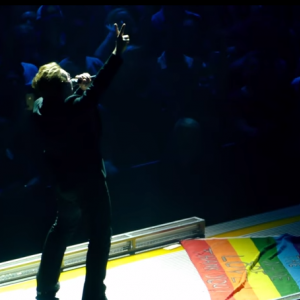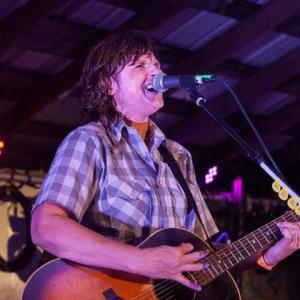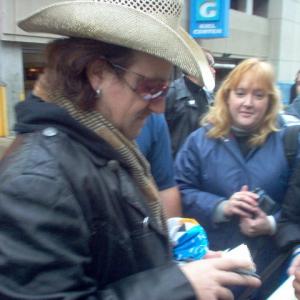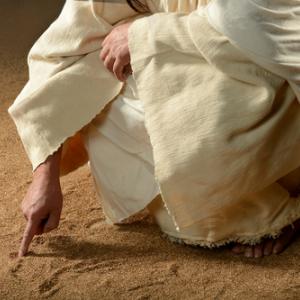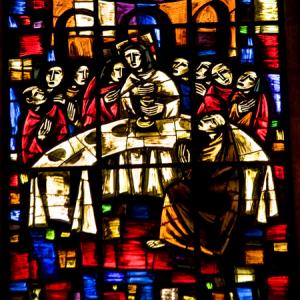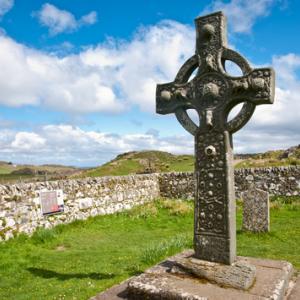Andrew William Smith is an English professor by day and DJ by night who works as the Faculty Head of the Tree House environmental living and learning village at Tennessee Tech. He’s an activist, poet, blogger, ruling elder in the PCUSA, Vanderbilt seminarian, and aspiring preacher. He blogs at http://unlikelysundayschool.blogspot.com/ and teacherontheradio.blogspot.com. Follow Andrew on Twitter @teacheronradio.
Posts By This Author
U2's Pride Celebration
On Sunday, June 28, the day of gay pride parades in Chicago and around the world, millions celebrated the recent United States’ Supreme Court decision that effectively legalized gay marriage at the national level. But David Wichman took his personal Pride rally to the General Admission (GA) line at the United Center.
With his hand-decorated rainbow flag in tow, he wanted to get a place close to the stage. His flag simply said: “IN THE NAME OF LOVE – THANK YOU!” Wichman wanted Bono and the band to know their work as allies had not gone unnoticed.
Dozens of fans bring their banners and signs to the GA floor on each night of the tour — but not every fan has their banner or sign lifted high by the lead singer onstage. As Bono had done in Arizona in May after the news of Ireland’s successful marriage referendum, he turned this spirited Sunday night show into a celebration of marriage (his wife Ali was in attendance), and a joyful tribute to the civil rights advocates who worked to make marriage equality a reality for the whole United States.
Rainbows Over Dublin and the Arc of Bono’s Activism
When Ireland became the first country to legalize same-gender marriage by popular mandate, double rainbows appeared over Dublin, and an Irish rock band transformed their Arizona concert into a gay-rights celebration. Almost 30 years ago, Bono endured threats from angry Arizonans for his support of the U.S. national holiday for the late Rev. Martin Luther King Jr. But on Saturday, Bono invoked King as peacemaker as U2 celebrated the victory of love, turning the song “Pride (In The Name of Love)” into an anthem for gay pride.
...
Bono shared, “This is a moment to thank the people who bring us peace. It’s a moment for us to thank the people who brought peace to our country. We have peace in Ireland today! And in fact on this very day we have true equality in Ireland. Because millions turned up to vote yesterday to say, ‘love is the highest law in the land! Love! The biggest turnout in the history of the state, to say, ‘love is the highest law in the land!’ Because if God loves us, whoever we love, wherever we come from … then why can’t the state?’”
Gown of Grief: The Collection’s Songs of Mourning and Celebration
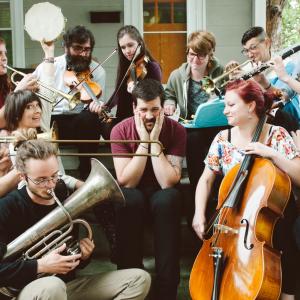
Photo by Stephanie Berbec Photography http://stephanieberbec.com/
No abundant bright bloom of flowers on the CD cover or obscure Latin in the title or gentle dance of cursive font describing the song list, nothing can hide that this is not your light-and-breezy summer release of cruising-with-the-top-down jams, but rather, a full-blown concept album of folk hymns about the art of dying.
The Art of Dying (officially Ars Moriendi) represents a brave and risky move for the make-it or break-it breakout album of an up-and-coming band. The Collection’s courageous collection of orchestral pop hymns chart and curate the grieving heart of a gifted songwriter and the community of bandmates and fans that surround him.
At a time when the flame of the alternative folk explosion still burns bright despite much backlash, this North Carolina ensemble shows up as the son of Mumford and Sons, married to Edward Sharpe’s second cousin, with too many members to pack the tiny stages of clubs and bars, with a sound fit for mountaintop vistas, and songs as mystic visions that pierce the veil between life and death.
Despite the heavy earnestness of the entire package, it’s exactly the grief-support-group that my ears need, and I imagine a rendering of fragile faith and hope against hope that our world craves. The Collection manage to sing about Jesus and Thomas and the prodigal son without getting pushy, dancing on the fringe of explicit CCM, exploring sacred-meets-secular crossover paths and gritty crossroads that groups like Needtobreathe, Drew Holcomb and the Neighbors, and Gungor have already traveled.
Death remains that earthly finality to render our denial mute — and our religious musings about whether it represents cosmic reunion, bodily resurrection, or eternal rest are powerless when we admit that the mysterious premonitions of the “heaven is real” crowd are but passing glimpses and not bulletproof facts. The Christians that remain relevant in our world have invested in the Kingdom here, now, and all around us, and they don’t shove tracts that guarantee afterlife fantasies in our faces on the same street corners where tramps and hobos sleep and sometimes starve.
Why I Am Still In Detroit
Nine days after my Dad’s memorial service on June 7, I am still in Detroit.
I am still in Detroit to volunteer as a member of the More Light Presbyterians communications team at the 221st General Assembly of the Presbyterian Church (USA).
I am still in Detroit because, for the better part of three decades, my father was an active member of the progressive movements within PCUSA for affirmation and inclusion, for peace with justice.
I am still in Detroit because my dear friends who got married on my former land in rural Tennessee could not have their vows acknowledged by church or state because they are both men.
Inspired and Inclusive Equality
For the better part of the last 30 years, my father has been a social justice activist serving as a leader within his Christian denomination, most specifically in various leadership roles where he could be an advocate for anti-racism education, universal health care, peace with justice in the middle East, and for full inclusion of our LGBTQ family within the body of Christ.
His activism actually dates back further, to the early 1960s when he marched with Dr. Martin Luther King, Jr. in Selma, Ala. His work in the 1990s and 2000s reflected a great depth of thought and commitment as he educated himself and others like him about the importance of recognition of the role of white heterosexual privilege in society and the need for collective repentance for ignoring structural sin regarding race, gender, class, and sexual preference. He worked to transform institutions that might inhibit the full expression of personhood for all of God’s children.
Visionary Vapor: Starting Lent with Michael Gungor and The Liturgists
It was a busy weekend on the eve of Lent for fans of spirited singer and spiritually-minded musician Michael Gungor. If you were not on the Gungor or Michael Gungor Twitter feed over the first two days of March, you might have missed the news about a new band, a new record, and a new mini-tour.
As the band called Gungor takes a short break from touring in support of its sonically and lyrically adventurous album I Am Mountain, the family business has reinvented itself with the proverbial “side project” so common with musical visionaries who cannot contain their creative output to just one brand name or band name.
But The Liturgists — a collective that includes Michael’s wife Lisa, brother David, and a host of other supporting musicians and collaborators — are not just another band, and the brand is “the work of the people.” The band’s Vapor EP is a warm and experimental worship text that includes a song, a spoken-word invocation and incantation, and a guided centering prayer meditation. On the group’s Ash Wednesday-week mini-tour, all the shows are free by RSVP and are not really shows as at all — not as indie-consumers even in the contemporary Christian scene have come to expect.
Let It Ring: Indigo Girls Grace The Goose
Amy Ray’s smile opened itself to wrap love around the couple thousand fans who’d weathered a soggy soaker of a spiritual festival to wait for their 10 p.m. Saturday set. “Y’all have advanced way past kum-bah-yah,” she quipped. “That was a deep album cut.”
For 90 minutes, Ray and her musical partner Emily Saliers couldn’t stop praising the Wild Goose Festival crowd. It’s as if they’d trekked to the misty mountains of western North Carolina just to see us render their greatest hits the new hymnal for progressive and inclusive Christianity. The stellar setlist covered all the ground, a collection of tracks both new and old spanning a career that jump-started itself in the same 1980s Georgia music scene that gave us the likes R.E.M. and Widespread Panic.
The Indigo Girls catalog knits itself into our daily lives in such a way to make them the perfect band for a campfire singalong at a radicals’ revival like this. But what else was obvious here could not be pinpointed in the mere practice of song. The best-selling grassroots folk duo found something in our makeshift festival that’s been true of their career — past all the great lyrics and legacy of activism, past the DIY-ethics and indie entrepreneurs' edge, past all the albums and compilations, past all the accolades — exists the chewy center of hope. We see the Holy Spirit at work in such a down-to-earth humbling and fiery fashion. The Indigo Girls headline set at Wild Goose 2013 healed the audience and sealed the festival’s cultural location in a jubilant justice movement for ecumenical and evangelical convergence on the funky fringes of mainstream Christianity.
Troy Bronsink’s 'Songs To Pray By' Travels To Wild Goose
Troy Bronsink’s meditative live album Songs to Pray By stretches its sonic arms to embrace every listener with expansive words of spirited awe and awesome humility, with ecstatic waves of audio grace and rhythmic gravity.
Bronsink and his band bring to church what we’ve seen out on the festival circuit for years: a shimmery and psychedelic use of sound and language to elevate listeners who choose to inhabit a song as if it were wings, the place where the spirit soars and the heart sings. We don’t often associate noodly guitars and trippy percussion with the worship sound, which is exactly why this album is such a perfect addition to the praise genre.
A solo Bronsink will be presenting his musical work tomorrow at the Wild Goose Festival. We both took a break from packing and planning our journeys to North Carolina for this email interview.
Second Time Around: Wild Goose Mixtape 2013
I’m excited to share this mixtape in honor of the Wild Goose Festival, Aug. 8-11 in Hot Springs, N.C.
For the festival proper, this third one will surely be a charm. But for me, it’s the second time around, hence the title of this playlist, also taken from an Indigo Girls song. Getting ready for a music festival for me requires hours upon hours of research: buying and downloading mp3s, studying sounds with the headphones on. These are just a few favorites I’ve found and suggestions for your weekend—mixing up the indie-folk with the psychedelic-liturgical with the pop-folk and power-pop.
The mixtape works like a storybook of sonic massage on the ears, guts, and heart. My prayer is that your listen will provide at least a sliver of the joy that making it offered. Hopefully you can allow this mix to accompany your packing routine or en route roadtrip. See you at the shows! Or if you cannot make it, hopefully these songs will remind you why you wish you could.
David Wimbish: Life, Death, Fundraising, and Festivals
At the 2012 Wild Goose, for an afternoon set at a tent tucked away on the backwoods of the festival site, a young North Carolina band blew minds and won fans. More than just a band — more like a multicolored movement of sonic jubilee — David Wimbish and the Collection carry the celebratory consciousness, lyrical significance, and live energy that have made bands like Mumford & Sons or Edward Sharpe & the Magnetic Zeros the darlings of the current folk-pop moment.
In August 2013, the Collection will open this year’s festival on the main stage with a Thursday night set sure to thrill us. Then, they will support Phil Madeira’s Friday night set. In the meantime, the Collection are furiously raising funds on Kickstarter for their next album, a surprisingly hopeful take on death called Ares Moriendi. I recently caught up with David Wimbish and convinced him to take a break from writing, recording, fundraising, and preparing for Wild Goose to answer a few questions.
Hugging Bono, Engaging Critics, and Wishing 'The Frontman' a Happy Birthday
I don’t know how I feel about liberalism or capitalism beyond the degree to which I participate in both by necessity. But I do know what I perceive as the source of my activism and Bono’s: Jesus and the Bible; spirituality and scripture; the new commandments of radical love and service taught by the carpenter from Nazareth. What’s been called the preferential option for the poor. Bono’s lack of economic literacy, or worse, allegiance to wrong-headed economic mentors, may make me and others uncomfortable and may play into the hands of the problem-creators rather than the problem-solvers, yet Bono’s Biblical, musical, and poetic literacy remain on target in my eyes and heart.
In 2005 just after How To Dismantle An Atomic Bomb, as much as I loved that record and the subsequent Vertigo tour, part of me wanted to give up on Bono for his self-imposed public silence on the Iraq War, for hanging so intimately with people like George Bush and my then least favorite Tennessean Bill Frist. That year, I picked up Bono: In Conversation with Michka Assayas. Not only does the front man answer all his critics in a nuanced manner, he diminishes and self-deprecates his own significance. The alleged egomaniac also has a streak of deep and deferential humility.
But more than that, he speaks ever so elegantly and evangelically about his faith in Jesus and how Christian religious perspective, spiritual practice, and central Gospel narrative inform everything he does. Like Bono, I am no economist, but also like Bono, I take seriously the Biblical teachings about poverty and justice.
The Wizard We Need
Like the masses, we flocked this past weekend to the megaplex for the opening of another would-be blockbuster, pleased to discover that the much-heralded and sometimes-maligned Oz prequel is even more good and wonderful than it is great and powerful.
Acting, plot, intrigue, color, mystery, and special effects: all these measure-up under the fantastic mastery of director Sam Raimi. But beyond the eye-candy, sensitive audience members might be as mesmerized by the movie’s deeper myth and redemptive meaning as by its cinematic technique.
Of course, if we remember the original movie and its myth, the wizard has issues, for there’s a man behind the curtain who is much more about a confession of subdued humility than a profession of supernatural agility. The prequel takes us back before the main myth — to see the man inside the man behind the myth.
Somewhere in the magical middle of this movie, the not-yet-wizard Oscar Diggs (James Franco) makes his confession: “I'm not the wizard you were expecting, but I may be the wizard you need.” We can apply this maxim everywhere. This truth uncovers the human simplicity of the Oz legend and its relevance to all our longings in realms related to power and spirit.
Jesus Didn't Vote Today: A Poem
Jesus didn’t vote today
Not tomorrow
Not yesterday
Jesus didn’t need the bullet or the ballot box or
The bomb or bayonet or budget
Jesus didn’t vote today
Jesus didn’t authorize drone strikes to kill thousands
Jesus didn’t occupy other countries with standing armies
Jesus was occupied by the Holy Spirit that occupies us even still
Jesus was occupied by the truth of radical love
Jesus was not a feeble, timid, compromised, casual, comfortable, middle-class,
Or otherwise complacent ap
Going Easy On The Church
Whenever dialogue about the fate of faith surfaces, which seems like always (and perhaps it’s been this way since disciples first broke bread together), the church gets hit the hardest. The “relationship-not-religion” rap remains popular on the right, the left loves to loathe abuses of ecclesial authority, and so on; thus the internal bickering multiplies like so many loaves and fishes.
When my denominational family, the Presbyterian Church USA (PCUSA), decided against sanctioning gay marriage at its recent General Assembly, I expressed support for the defeated measure on my Facebook page and reposted a blog that denounced some of the more bigoted remarks from the assembly’s discussion floor. An old friend who participates in a Unitarian Universalist congregation read my post and replied, suggesting that I might be “going too easy on the church,” perchance because my comments accompanying the reposting were not harsher and more dramatic in my critique of what many view as religiously motivated homophobia.
This phrase and image of “going easy on the church” stuck in my mind because the church has been quite easy for me — inviting me, a confessed sinner, into its doors and into its community, after years of walking on the slippery slopes and loose living of the wild side.
In my experience, the church has not just been easy on reformed sinners, it has been easy on the poor, the lonely, the recovering addicts, the very young, and the very old. The church makes life easier for a lot of people, with its marrying and mourning, peacemaking and potlucks, prayer groups and parenting classes, rummage sales and support for refugees, disaster relief and radical discipleship.
A Personal Cross Responds to Its Progressive Critique
Biting and unbelieving comedian Bill Hicks challenged Christians about wearing crosses around our necks. He chided us that when Jesus comes back, the last thing he would want to see is another cross. Not unlike Hicks, liberal theologians get squeamish about the saving power of the cross and distance themselves from it with critiques that attack academic euphemisms like blood atonement.
My friend, colleague, and our “religion and culture” book-discussion leader assigned our Sunday school class homework this week: Consider and contemplate our understanding of and relationship with the cross. And do this in the context of a compelling and challenging chapter called “The Cross as Futility, Not Forgiveness” in an excellent and provocative book we’re reading by Robin Meyers called Saving Jesus From The Church: How to Stop Worshiping Christ and Start Following Jesus. This post serves as part of my response to that homework.
Crosses as powerful symbols predate Christianity and are not the singular insignia of our faith. Some Christians prefer the fish to the cross as an identity marker for Jesus followers. I confess I simultaneously love the empty cross and accept brutality of the bloody crucifix. As contradictory and ubiquitous its grip on our consciousness, we cling to it in comfort. As theologically problematic as we might render its salvific power, we sing of “the rugged cross” and need “nothing but the blood.”
From my enormous sympathies for Meyer’s intentions and investigations, I’m ultimately left lingering with discontent at his conclusions. I easily devoured Saving Jesus, and alongside my mixed reactions to the text, our class discussions have helped me to wrestle with not just my responses to the book in particular but to clarify my faith and theology more generally.
Holy Biofuel & Justice Juice: A Musical Review of Wild Goose
On the opening night of the second Wild Goose Festival late last month in Shakori Hills, N.C., the dancing hadn't started yet.
The fabulous parades and the frenzied-yet-friendly almost-moshing were yet to commence on the grassy playscape in front of the main stage. Before things got wild for us goslings, we had to unpack our musical expectations and pitch a tent large enough to welcome the broadest of folds.
Kicking things off was Josh Garrels, who brought his smoothly smoky-folky sound with its pleasant rasp that recalls adult-alternative icons like Ray LaMontagne and Amos Lee. Following Garrels, former frontman of the band Caedmon’s Call and current experimental multi-genre provocateur Derek Webb pushed at the already broad boundaries of the Wild Goose aesthetic.
With several funny, yet biting, remarks during his plenary setlist, Webb outright rejected the “Christian music” label and bathed our brains with songs such as “A New Law,” the 2005 sarcastic anthem where bold freedom and blind faith wrestle it out for the soul of contemporary Christendom. Webb threw down a gauntlet with lyrics such as, “don't teach me about loving my enemies/don't teach me how to listen to the Spirit/just give me a new law.”
But on Friday, with fiery folk rock a la R.E.M. or Wilco, Damion Suomi and the Minor Prophets fired back a response. “The Lion, The Ram & The Fish” served up an antidote as we negotiated our weekend-long truce in the culture wars with this refrain: “Love your God with your heart, love your neighbor as your own, and the rest is just a guess as good as mine.”
Heat, Hope, & Hootenanny: The Holy Spirit Gets Cooking At Wild Goose
SHAKORI HILLS, N.C. — On a swelteringly hot solstice weekend in the southeast, a couple thousand folks gathered in the woods of North Carolina to get their collective goose cooked. An early summer camp like no other, this second annual festival invokes a Celtic image of the Holy Spirit and sparks unlikely convergences inside the great emergence of the contemporary Christian counterculture.
The Goose blends the best of an intellectually engaged faith conference and social justice activist base camp with the sonic frivolity of a modern rock festival and stirs all concepts and collapses all constructs in a steamy potluck stew of primal camp meeting and postmodern tent revival. Without a doubt, the blossoming and beckoning of the Wild Goose movement in North America heralds a bright radical future for today’s Jesus followers bringing the kingdom come.
Wild Goose Festival: Sunday Call to Worship from cathleen falsani on Vimeo.
